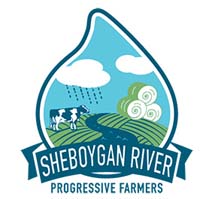
For farmers, committing to planting cover crops is one thing. Figuring out how to do it is another.
That was the focus at a Sheboygan River Progressive Farmers field day on April 21 as participants explored the right seed mix, when to plant and the best time to terminate the crop.
Nearly three dozen farmers heard from Dan Smith, researcher in the Nutrient and Pest Management Program at the University of Wisconsin-Madison, along with Tony Peirick, chairman of the Dodge County Farmers for Healthy Soil – Healthy Waters farmer-led group.
“My big thing was when and what to do with the turnips that made it through the winter because I wasn’t expecting that,” Wagner said. “I planted a multispecies cover crop last fall, expecting just the crimson clover to make it and I didn’t know what effect the turnips would have on my corn. What was talked about today gave me great insight as to when I am going to terminate the turnips.”
Turnips are used as cover crops because they are inexpensive and grow quickly, which helps them scavenge high amounts of nitrogen. Turnips also decompose residue to suppress weeds until the spring.
“It is essential to try these species on your farm so you get to know how to manage them, how they are going to grow on your farm and what they are going to look like,” Smith said. “This is a great test case — a great example of sometimes what can unexpectedly happen when you grow a cover crop, but certainly not a bad thing either. This is something that is easily managed with termination techniques and very easy to plant into as well.”
“It’s going to take farmer-to-farmer contact and talking, along with field days, to show farmers they can do it,” Peirick said about implementing more cover crops. “They are just afraid to do it and everybody is set in their ways. By understanding the soil, and what living soil is, and by introducing these chemicals, you are killing so much of the biology.”
Peirick has learned over the years that fertilizer and chemicals aren’t the answer on his farm. He hasn’t sprayed either on his crops in years and now plants solely into green.
“I don’t think we’ll ever learn everything we need to know about the soil,” Peirick said. “It’s an exciting time in agriculture coming up because regeneration and growing cover crops will get your soil back to where it is supposed to be. It will also help the farmer’s bottom line.”
About Sheboygan River Progressive Farmers:
Sheboygan River Progressive Farmers is a nonprofit farmer-led conservation group in the Sheboygan River watershed in Sheboygan and Fond du Lac Counties in Wisconsin whose members explore farming strategies that lead to improved soil health, greater farming efficiency, sustained profitability and reduced environmental impact. Members share information gained through field trials with fellow farmers and strive to foster an understanding of the role of agriculture in the community. More information: https://srpfarmers.com





